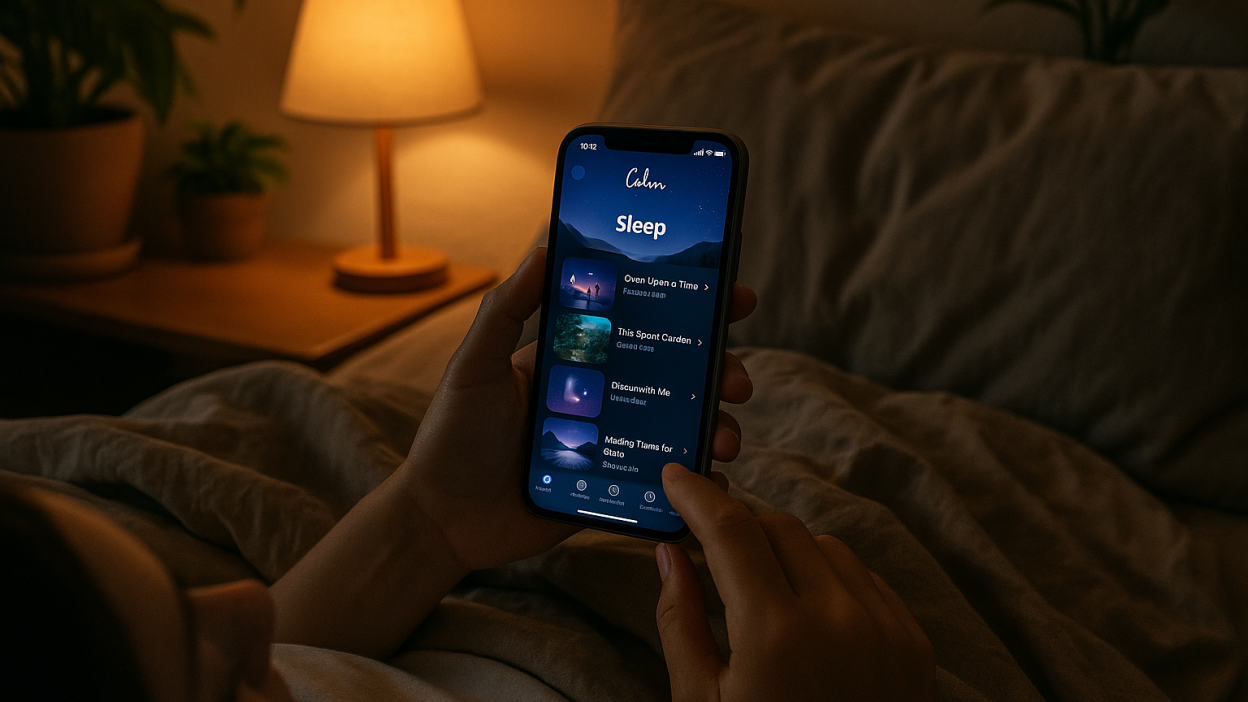Sleep Smarter: Calm Unveils Standalone iOS App to Help Users Sleep Better
Sleep has long been a cornerstone of health, productivity, and emotional resilience, yet millions of people struggle to get enough rest. In an age of constant connectivity, heightened stress, and 24/7 demands, the quest for restorative sleep has become more urgent than ever. Recognizing this, Calm—a leader in meditation and wellness—has introduced a new standalone iOS app specifically designed to support sleep. This move signals a deeper commitment to addressing one of the most common and overlooked health challenges in modern life.
The relevance of this new app goes far beyond its technical features. It reflects an evolving understanding that sleep is not a one-size-fits-all experience and that personalized, accessible tools can empower users to reclaim their nights and, in turn, their days. As sleep disorders, anxiety, and burnout increasingly affect individuals across age groups, Calm’s initiative resonates with people seeking practical, science-backed solutions to improve their well-being.
Moreover, the launch of this dedicated app underscores the broader societal impact of sleep deprivation. It is linked to cognitive decline, weakened immunity, and even economic losses in workplaces. By offering an intuitive, user-friendly platform that caters specifically to sleep needs, Calm is not merely helping users fall asleep—it’s promoting healthier lifestyles, better mental health, and greater life satisfaction. In the sections that follow, we’ll explore how this app fits into today’s wellness landscape, the science behind sleep support, and practical advice for anyone looking to prioritize rest in their lives.
Why Sleep Matters: The Science and Human Experience
Sleep is often underestimated, yet research continues to reveal how integral it is to physical and mental health. According to the Centers for Disease Control and Prevention (CDC), over one-third of adults in the U.S. do not get the recommended 7 hours of sleep per night. Chronic sleep deprivation is associated with cardiovascular disease, obesity, diabetes, anxiety, depression, and weakened immune function.
But beyond medical statistics, sleep affects how we feel, how we work, and how we interact with others. Those who struggle with rest often report irritability, decreased motivation, and lower emotional resilience. Sleep doesn’t just repair the body; it restores the mind. During sleep, the brain consolidates memories, processes emotions, and flushes out toxins that accumulate during waking hours.
Calm’s sleep app taps into this science. It combines relaxation techniques, breathing exercises, and sleep-inducing soundscapes to help users transition from wakefulness to restful sleep. It’s not about forcing sleep or quick fixes; it’s about creating a supportive environment that respects the body’s natural rhythms.
The human experience of sleep challenges is equally diverse. Some face stress-induced insomnia, others struggle with sleep apnea or restless leg syndrome, while many experience erratic schedules that disrupt their sleep patterns. The app’s customizable approach acknowledges these differences and helps users explore sleep support tools that best suit their lifestyles.
Features of Calm’s Sleep App: Personalization Meets Science
Calm’s new standalone iOS app is built with personalization and evidence-backed methods at its core. Here’s how it differentiates itself from generic sleep tools:
Tailored Sleep Journeys
Upon first opening the app, users are guided through a series of questions to understand their sleep habits, lifestyle, and stress levels. Based on this data, the app curates a tailored sleep journey that evolves as users log more experiences. Whether it’s deep relaxation for chronic insomnia or stress-reduction exercises for restless minds, the app adapts over time.
Expert-Designed Soundscapes and Meditations
The sleep sessions are crafted by sleep scientists, meditation teachers, and mental health professionals. The soundscapes include soothing nature sounds, gentle white noise, and calming music tracks that mimic the natural transition into sleep. Guided meditations address issues such as anxiety, breathing control, and body relaxation.
Real-Time Sleep Tracking
For users who consent, the app syncs with Apple HealthKit to track sleep patterns and heart rate variability. This data informs adjustments to recommended routines, creating a feedback loop that helps users understand how habits influence sleep quality.
Mindfulness and Sleep Education
In addition to relaxation techniques, Calm’s app offers bite-sized lessons on sleep science, helping users demystify sleep myths and better understand how lifestyle choices impact rest. Education is paired with actionable tips, making users feel empowered rather than overwhelmed.
Offline Accessibility
Recognizing that many users prefer to disconnect at night, the app offers downloadable sleep sessions. This ensures that users can access sleep support tools even in areas with poor internet access or when traveling.
Real Users, Real Sleep Transformations
To understand how the app is impacting users, we examined feedback from early adopters. Here are a few anonymized case studies that highlight the app’s potential:
Emily, 34, Marketing Executive
Emily struggled with sleep onset insomnia triggered by work stress. After using Calm’s sleep app for two months, she reported falling asleep faster and waking up less frequently. The breathing exercises and guided meditations helped her decompress before bed, and her sleep tracking data showed a gradual improvement in total sleep time.
Case 2: Raja, 45, Entrepreneur
Raja’s erratic schedule made sleep patterns inconsistent. Using the app’s personalized sleep journeys, he developed a nightly routine involving light stretching and soft soundscapes. His heart rate variability data indicated improved relaxation, and his daytime energy levels noticeably increased.
Mia, 19, College Student
With academic pressure affecting her rest, Mia benefited from the app’s sleep education modules. Understanding how screen exposure and caffeine impacted her sleep helped her make conscious adjustments. She reported feeling more in control and less anxious around bedtime.
These stories reflect a common thread: sleep improvements are gradual and holistic. The app provides tools to guide users, but the transformation stems from users’ willingness to embrace change and explore personalized paths to wellness.
Sleep Challenges in Today’s Society
The importance of tools like Calm’s sleep app becomes clearer when we examine societal trends contributing to sleep deprivation:
Technology Overload
The rise of smartphones, streaming services, and digital entertainment means that many people spend hours exposed to artificial blue light, which suppresses melatonin production and delays sleep onset.
Stress and Anxiety Epidemic
According to the Anxiety and Depression Association of America, nearly 40 million adults suffer from anxiety disorders, many of whom also report disrupted sleep. Stress management tools that promote relaxation are critical for breaking this cycle.
Shift Work and Global Connectivity
With flexible work schedules and global communication tools, sleep schedules have become increasingly erratic. Many workers struggle to maintain consistent sleep hygiene, impacting mental clarity and physical health.
Health Disparities
Access to sleep support is often limited by socioeconomic factors. By offering an affordable and accessible tool, Calm’s app helps bridge gaps and provides solutions that do not require expensive medical interventions.
Actionable Tips for Better Sleep with Calm’s App
Here are practical ways users can maximize the benefits of the sleep app:
-
Set a Consistent Bedtime – Train your body by sticking to a regular sleep schedule.
-
Create a Sleep-Friendly Environment – Reduce light and noise disturbances with calming soundscapes.
-
Limit Screen Exposure – Use the app’s offline features to unwind without distractions.
-
Engage in Daily Relaxation – Practice breathing exercises during the day to lower stress levels.
-
Track Sleep Patterns – Reflect on data insights to make informed lifestyle changes.
-
Learn About Sleep Hygiene – Incorporate educational modules to better understand your body’s needs.
-
Celebrate Small Wins – Acknowledge improvements in sleep duration and mood to reinforce healthy habits.
Calm’s launch of a standalone iOS sleep app marks a significant step forward in the pursuit of better sleep and holistic wellness. By combining science-backed techniques, personalized routines, and expert guidance, the app empowers users to take charge of their rest in a way that feels supportive rather than prescriptive.
Beyond its technical features, the app’s true strength lies in its human-centered approach. It recognizes that sleep is deeply personal and shaped by lifestyle, stress, and mental health. By offering accessible tools that educate and support, Calm helps users reclaim their nights and, by extension, their well-being.
As sleep continues to be a silent epidemic affecting millions, innovations like Calm’s app offer hope—not just for better rest, but for healthier minds, bodies, and communities. It’s a reminder that the path to wellness starts with compassion, patience, and the courage to prioritize self-care.
FAQs
1. How is Calm’s sleep app different from its meditation app?
The sleep app is tailored specifically for sleep challenges, offering personalized routines, expert-designed soundscapes, and sleep education focused on rest.
2. Can the app track sleep data?
Yes, it integrates with Apple HealthKit to monitor sleep patterns and heart rate variability, offering tailored advice based on user behavior.
3. Is it suitable for people with chronic sleep disorders?
While not a medical solution, the app provides evidence-backed tools to support relaxation, sleep onset, and education that can complement professional care.
4. Can users access content without internet?
Yes, downloadable sessions allow users to access sleep tools offline, ideal for travel or areas with poor connectivity.
5. How long before seeing results?
Results vary by individual, but many users report improvements in sleep onset and duration within a few weeks of consistent use.
6. Is the app free?
The app offers a basic free version with limited sessions and a premium subscription that unlocks advanced content and personalization.
7. How does the app promote mindfulness?
It incorporates breathing exercises, guided meditations, and sleep education to help users become more aware of stress triggers, thought patterns, and lifestyle habits, fostering long-term mental wellness alongside improved sleep.
Ready to take the first step toward better sleep? Subscribe to our newsletter for expert tips, relaxation techniques, and the latest updates on wellness tools like Calm’s sleep app. Empower yourself with knowledge, support, and guidance to sleep better and live more fully.
Note: Logos and brand names are the property of their respective owners. This image is for illustrative purposes only and does not imply endorsement by the mentioned companies.



